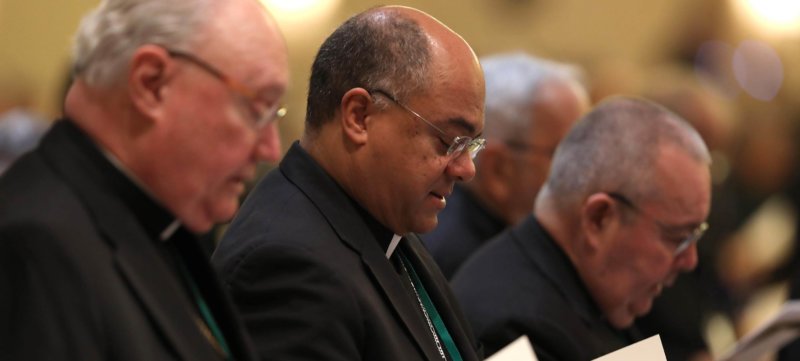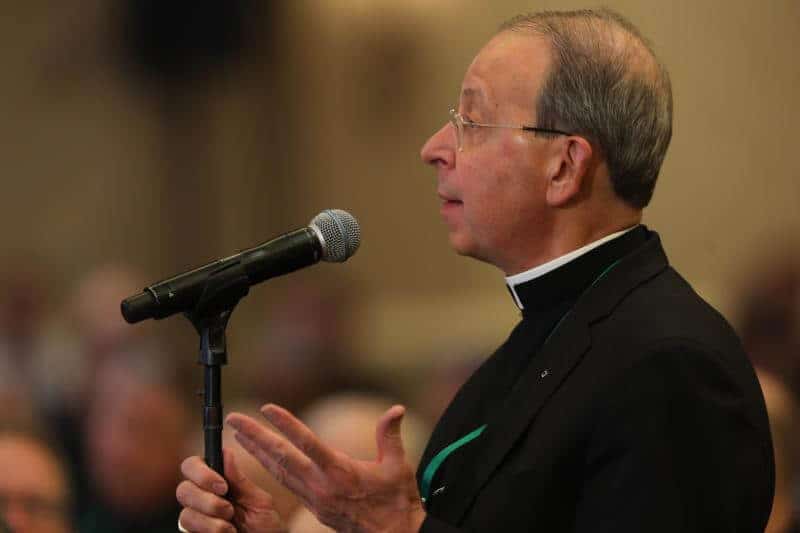
BALTIMORE (CNS) — During their Nov. 11-13 meeting in Baltimore, the U.S. bishops elected new officers and discussed challenges in the church and the nation. They spoke of their renewed efforts to help immigrants, youth and young adults, pregnant women and the poor as well their steps to combat gun violence and racism.
Unlike recent previous meetings, their response to the clergy abuse crisis was mentioned but was not the primary focus.
On the second day of the meeting, Nov. 12, the bishops elected Archbishop Jose H. Gomez of Los Angeles to a three-year term as president of the U.S. Conference of Catholic Bishops and Archbishop Allen H. Vigneron of Detroit as conference vice president.
Archbishop Gomez, the first Latino to be elected to this role, was chosen with 176 votes from a slate of 10 nominees. He has been USCCB vice president for the past three years and his new role begins at the end of the Baltimore gathering.
At the start of the meeting, the bishops voted overwhelmingly on a revised set of strategic priorities to take them into the next decade. The next day, they approved adding new materials to complement “Forming Consciences for Faithful Citizenship,” their long-standing guide to help Catholics form their consciences in public life, including voting. The addition included the statement that called abortion the preeminent social issue of our time.
The second day of bishops’ meeting coincided with oral arguments at the Supreme Court over the fate of the Deferred Action for Childhood Arrivals program, known as DACA and bishops at the Baltimore meeting spoke up in defense of DACA recipients on the floor and in interviews with Catholic News Service.
Bishops also heard a wide-ranging report on immigration Nov. 12, which included updates of policy, how programs to resettle refugees, including those run by the Catholic Church, have closed or reduced activity because the administration has moved to close the country’s doors to those seeking refuge, and efforts on the border to help asylum cases.
After the report, Major-Archbishop Borys Gudziak of the Ukrainian Catholic Archeparchy of Philadelphia said that no community, more than Catholics in the U.S., know what it’s like to be an immigrant in this country.
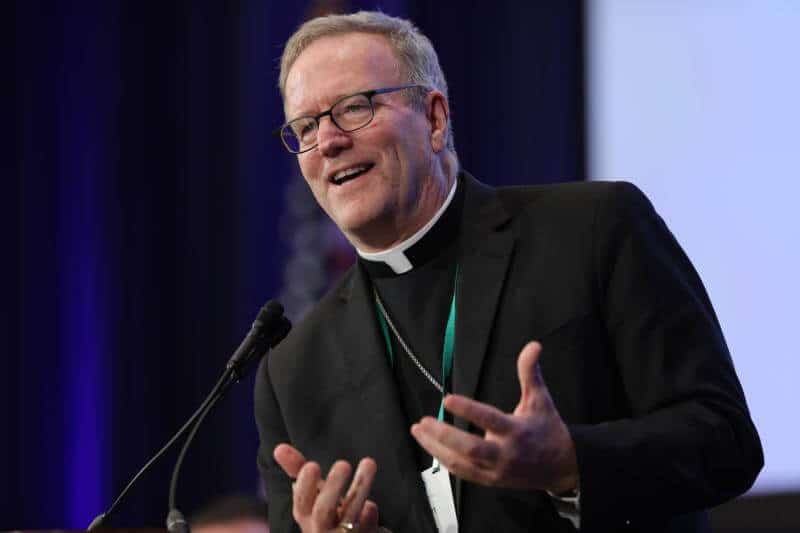
The bishops’ second day of meetings also included a presentation of the pope’s document “Christus Vivit,” which was issued following the 2018 Synod on Young People, the Faith and Vocational Discernment. Bishop Frank J. Caggiano of Bridgeport, Connecticut, who had been a delegate at the synod, urged bishops to do more to support Catholic teens and young adults and to use the pope’s apostolic exhortation as their guide.
The previous day, Auxiliary Bishop Robert E. Barron of Los Angeles told the bishops the church is losing young people in greater numbers and must face the challenges of how to get the religiously unaffiliated, or “nones,” particularly young people, back.
He presented a three-minute video on the issue and spoke of his concerns and ideas for bringing young people back to church which involved: not dumbing down the faith and involving young people in the social justice aspects of the church. Discussion about this from the floor lasted for more than an hour with bishops from across the country agreeing that the issue is of great concern and sharing other ideas to bring young people back which primarily involved catechism but also an increased devotion to Mary.
Bishop Barron, chairman of the bishops’ Committee on Evangelization and Catechesis, who is known for his website, “Word on Fire,” and for hosting the documentary series “Catholicism,” initially brought up this topic during the bishops’ spring meeting. He said at the time, and reiterated Nov. 11, that this topic needs to be a priority for the church today.
The bishops also heard that a new “pastoral framework for marriage and family life” should be ready for a vote by the U.S. bishops by next November at the latest, according to Archbishop Charles J. Chaput of Philadelphia, chairman of the U.S. bishops’ Committee on Laity, Marriage, Family Life and Youth. He stressed that it is not a “plan,” since it is intended to be applied within parishes and dioceses.
At the start of their meeting Nov. 11, the bishops raised pressing issues that included the priesthood shortage, gun violence and the need to provide support services for pregnant women.
Archbishop Christophe Pierre, papal nuncio to the United States, mentioned some of these challenges in his opening remarks, along with the need to welcome migrants and fight racism. He also urged the bishops not just to focus on the challenges before them but to consider how they could further develop collegiality and collaboration with one another.
In his final address as president of the U.S. Conference of Catholic Bishops, Cardinal Daniel N. DiNardo of Galveston-Houston told his fellow bishops that it has been “an honor to serve you, even in the difficult times.”
The 70-year-old prelate thanked the bishops, whom he called brothers, for the past three years and was thanked by them in return when the group gave him a standing ovation at the end of his nine-minute presentation.
“Let’s begin anew,” he said, at the close of his address, veering away from prepared remarks, and quoting St. Augustine.
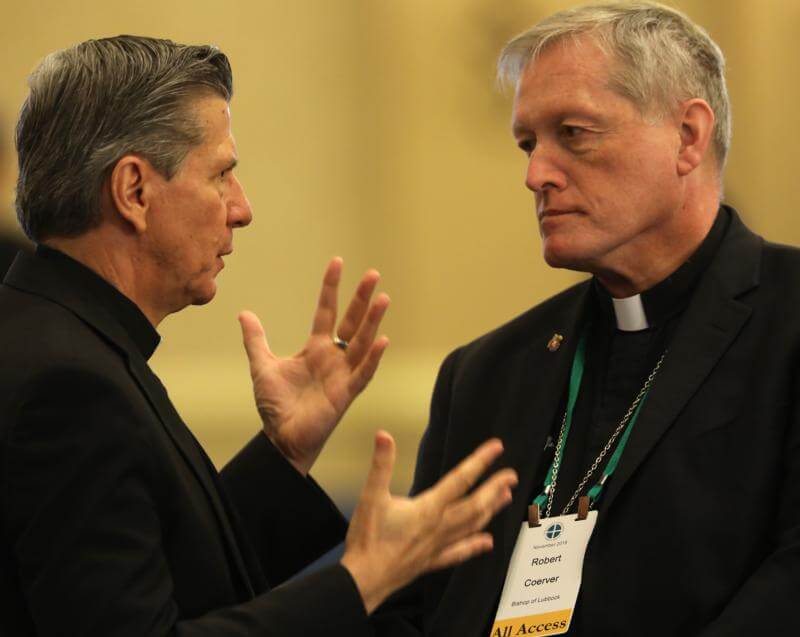
The cardinal, who suffered a mild stroke earlier this year, did not elaborate on specifics of the abuse crisis in the church, particularly highlighted this past year, but spoke of the bishops’ continued work of transparency related to dealing with the crisis. He said the abuse measures adopted by U.S. bishops at their meeting last June are “only a beginning. More needs to be done.”
At the start of the meeting, Bishop Earl A. Boyea of Lansing, Michigan, asked for an update on the Vatican’s report on the McCarrick situation, which many of the bishops, by voice vote, also said they wanted to hear.
In a brief presentation, Boston Cardinal Sean P. O’Malley told the bishops the Vatican has not yet published a report about its investigation of now-defrocked former U.S. Cardinal Theodore E. McCarrick, but a report could be ready by Christmas, or in the new year.
He said he and other bishops at the Vatican for their recent “ad limina” visit said they were “anxious to receive the Holy See’s explanation of this tragic situation, how he could become an archbishop and cardinal, who knew what and when.” He also stressed that the “long wait has resulted in great frustration on the part of bishops and our people and indeed a very harsh and even cynical interpretation of the seeming silence.”
In a presentation on gun violence, Bishop Frank J. Dewane of Venice, Florida, said Catholic clergy and lay leaders can play a role in bringing together people along the rural-urban divide to build understanding of the need for sensible policies that can end the scourge of gun violence.
The bishop, who is chairman of the U.S. bishops’ Committee on Domestic Justice and Human Development, outlined the USCCB’s long-held stance of the need for “common sense” legislation that governs the availability of guns. But he also said it was time for people to come together so that there is greater understanding of how gun violence affects urban communities in particular.
He told Catholic News Service that the USCCB’s work on the legislative front was important, but that a pastoral response to gun violence was needed.
“It’s time for a different approach,” he said.
In a new approach for the bishops’ pro-life efforts, Archbishop Joseph F. Naumann of Kansas City, Kansas, invited his fellow bishops to devote a year of service to pregnant women starting next March.
He said Catholic parishes can be one of the first places a woman facing an unexpected or challenging pregnancy can turn to for assistance rather than think of seeking an abortion and they could offer a variety of support services to women who may be thinking about whether to carry their child to term.
The bishops also voted for a new sixth edition of of the U.S. Conference of Catholic Bishops’ existing Program of Priestly Formation for U.S. dioceses; before it can be implemented, it must first receive a “recognitio,” or approval, from the Vatican Congregation for the Clergy. They approved a text translation to be used in the Order of Christian Initiation of Adults and OKd close to 300 new hymn texts for the Liturgy of the Hours.
The three-day meeting wrapped up Nov. 13 with a presentation by Bishop Shelton J. Fabre of Houma-Thibodaux, Louisiana, chairman of the U.S. bishops’ Ad Hoc Committee Against Racism, who spoke about the ongoing work of the committee, highlighting the listening sessions that have taken place around the country.
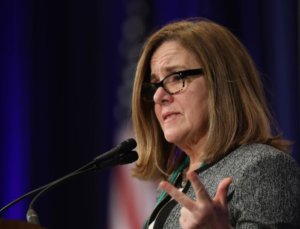
The bishops also heard presentations about Catholic Charities USA, Catholic Relief Services and the Catholic Legal Immigration Network, or CLINIC.
Anna Gallagher, CLINIC’S executive director, told the bishops about her organization’s extensive work at the border which she said was “just a drop in the bucket” for all those who need help. She noted that in parishes and Catholic social service programs people are “rightly worried” about workplace raids, threats of deportation, family separation and the potential loss of Temporary Protected Status and DACA.
In her report on Catholic Charities USA, Dominican Sister Donna Markham, CEO and president, told the bishops the agency’s healthy housing initiative is collaborating with diocesan Catholic Charities programs, parishes, local funders and Catholic health care systems to on a program gram to address chronic homelessness and guiding people into permanent housing, while saving millions of dollars in health care costs.
Bishop Gregory J. Mansour, who heads the Eparchy of St. Maron in Brooklyn, New York, gave a report on Catholic Relief Services as its board chairman. He highlighted the organization’s work around the world, saying it works to ensure that Catholic values underlie its relief and development work.
At the meeting’s close, Archbishop Gomez thanked outgoing president Cardinal DiNardo for his “excellent service to this body and to the church.”
Copyright ©2019 Catholic News Service/U.S. Conference of Catholic Bishops.

